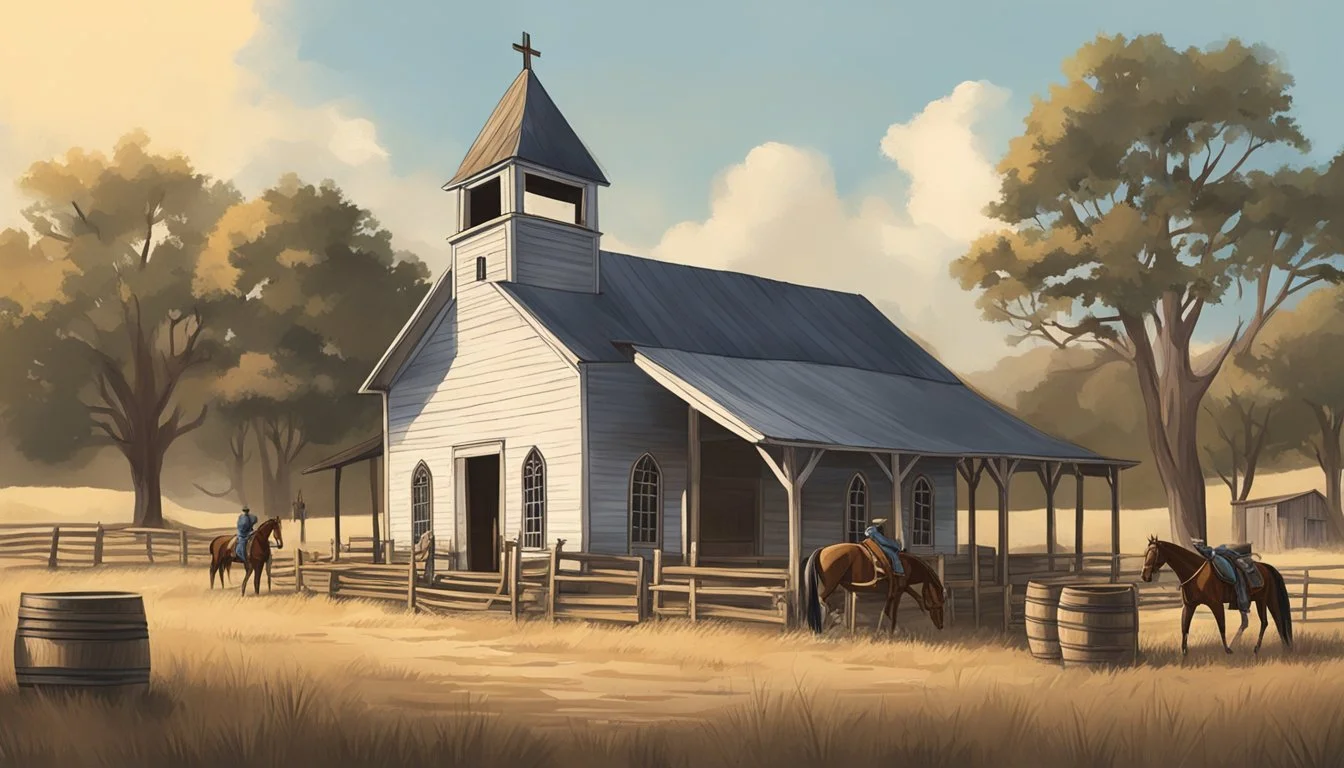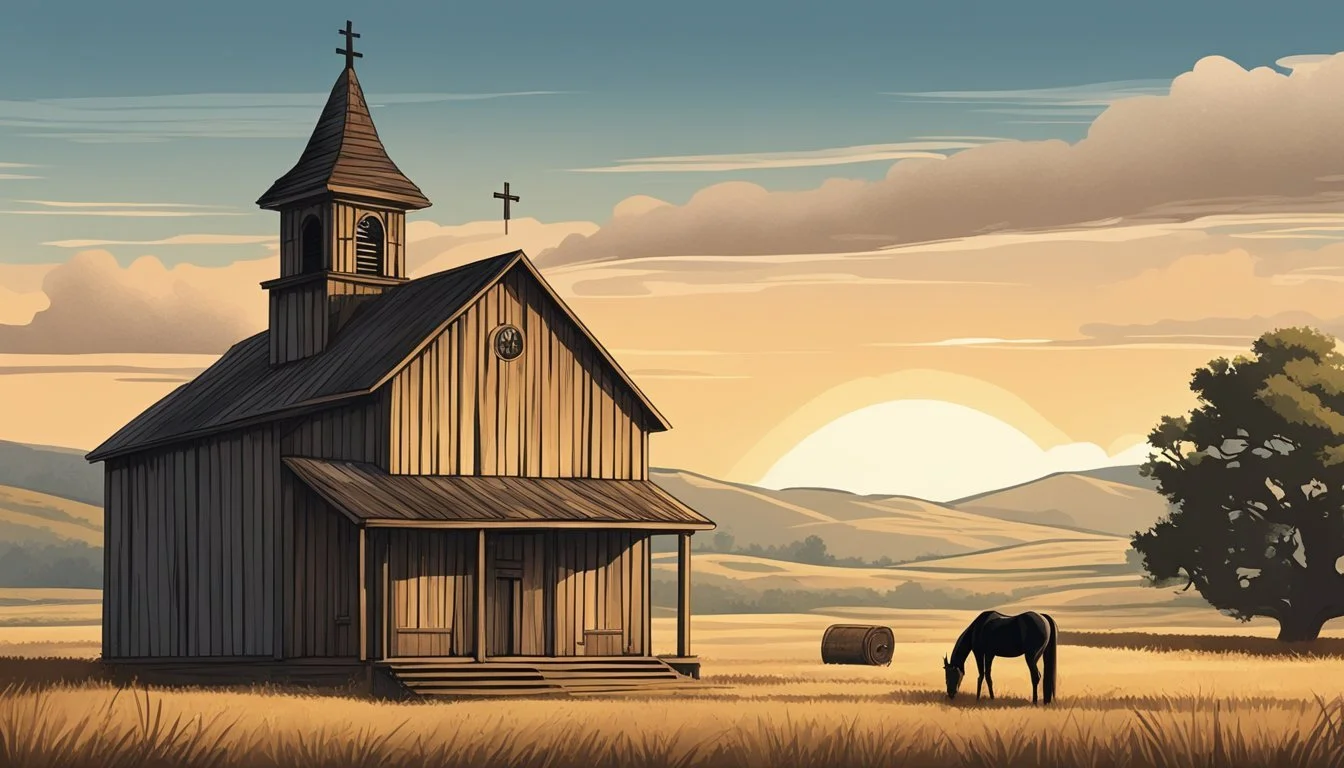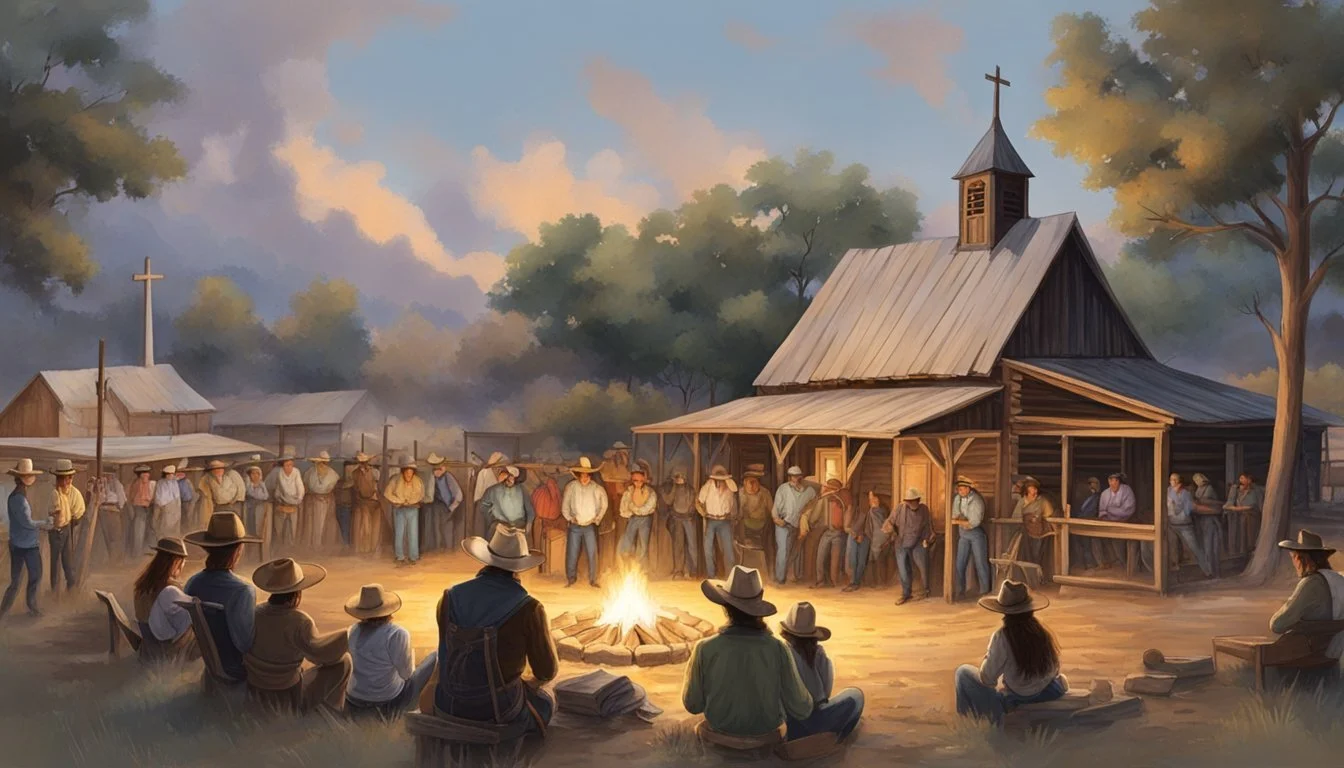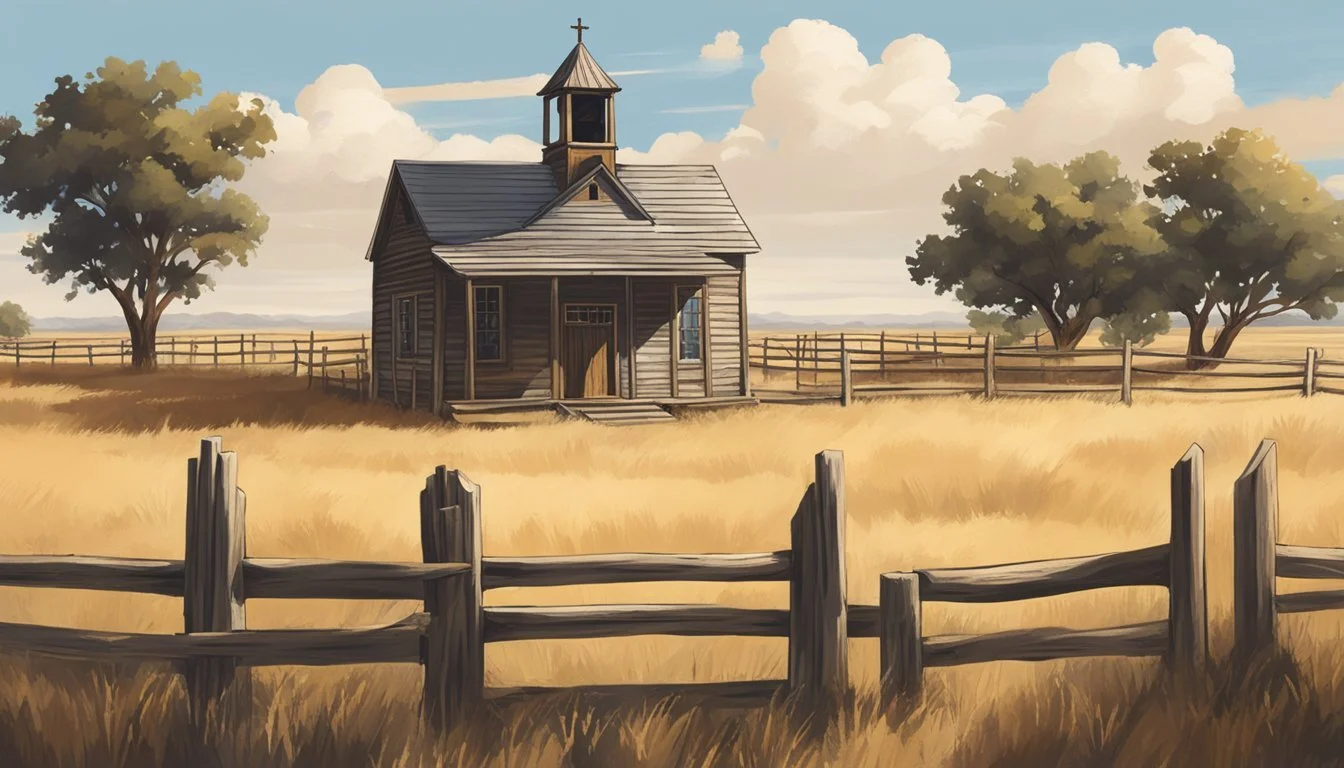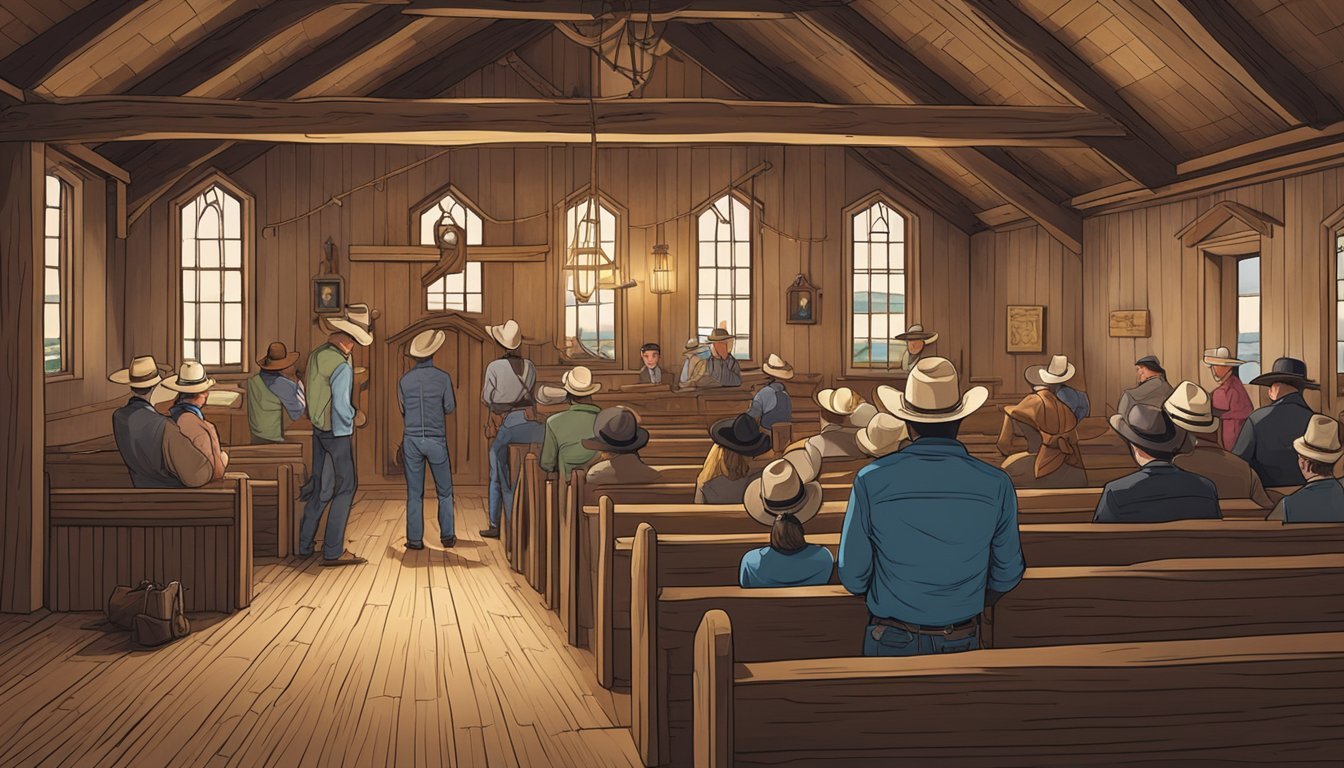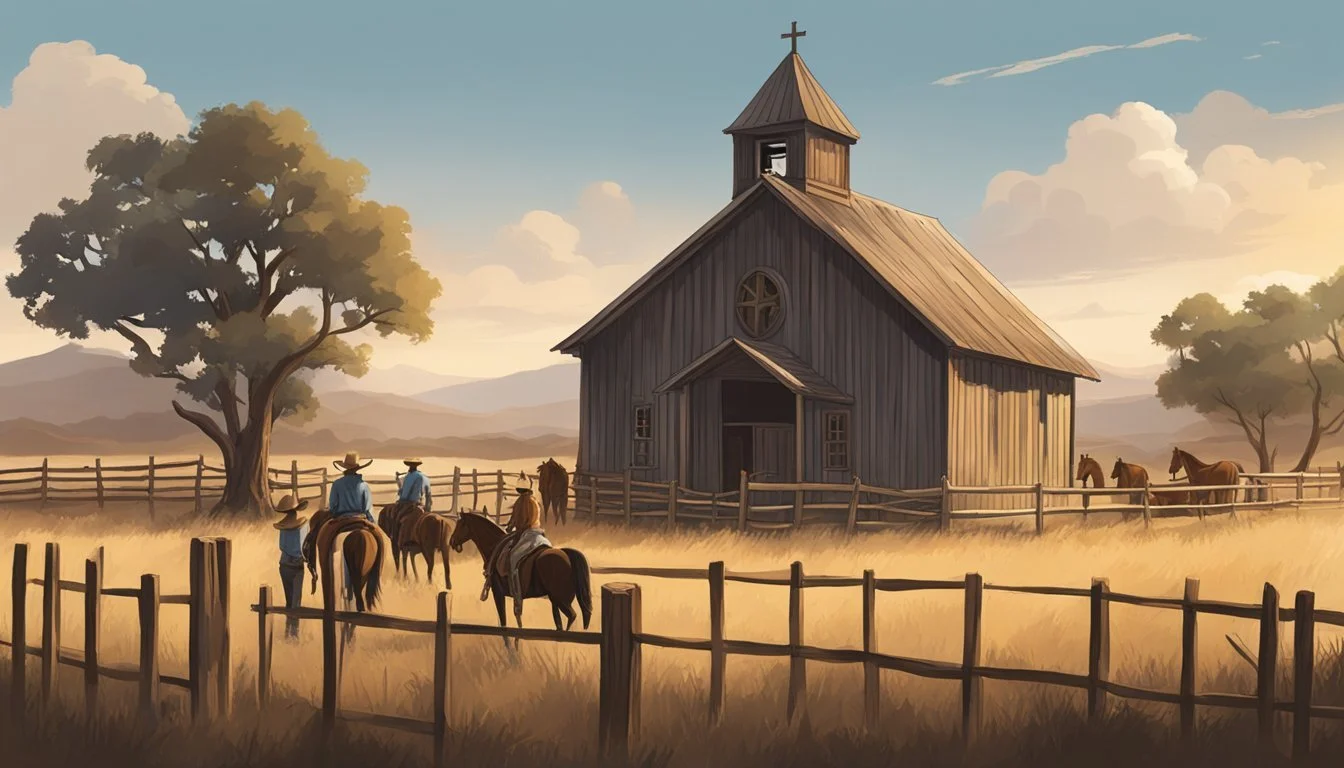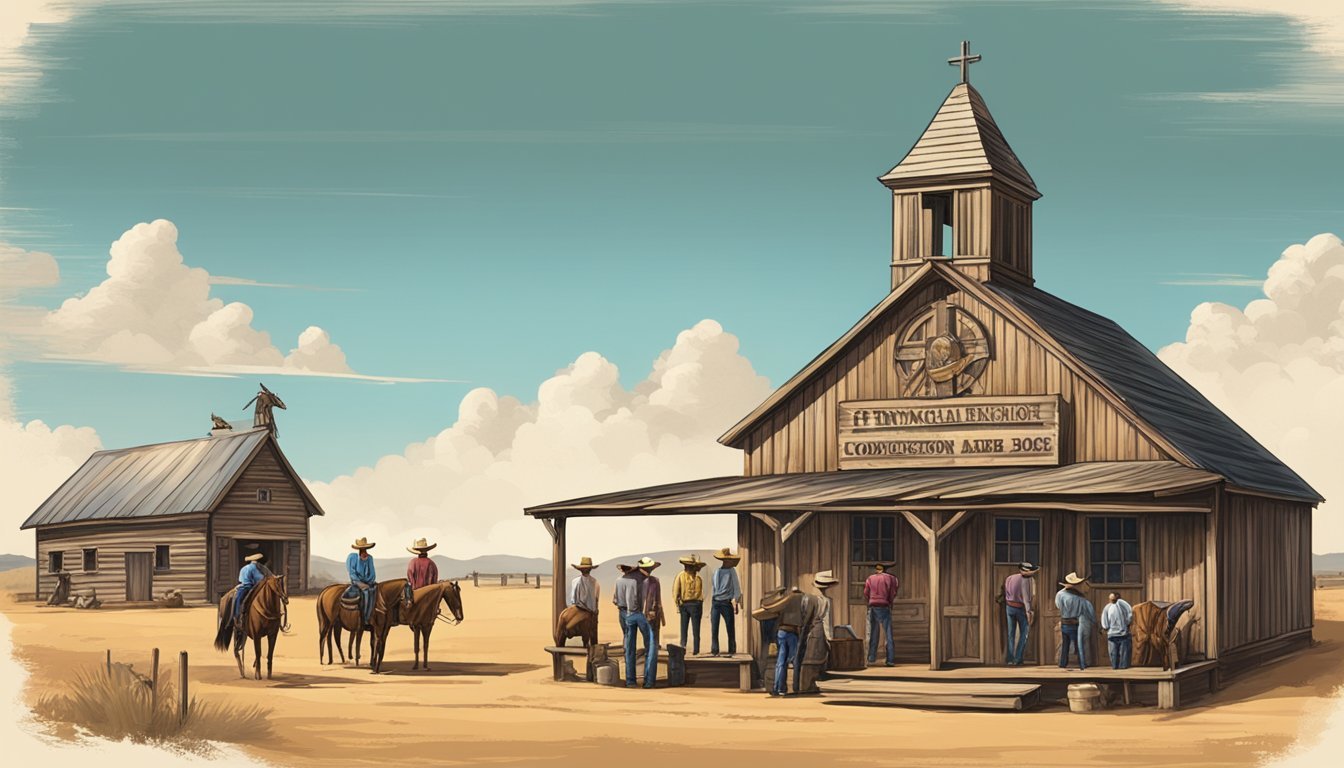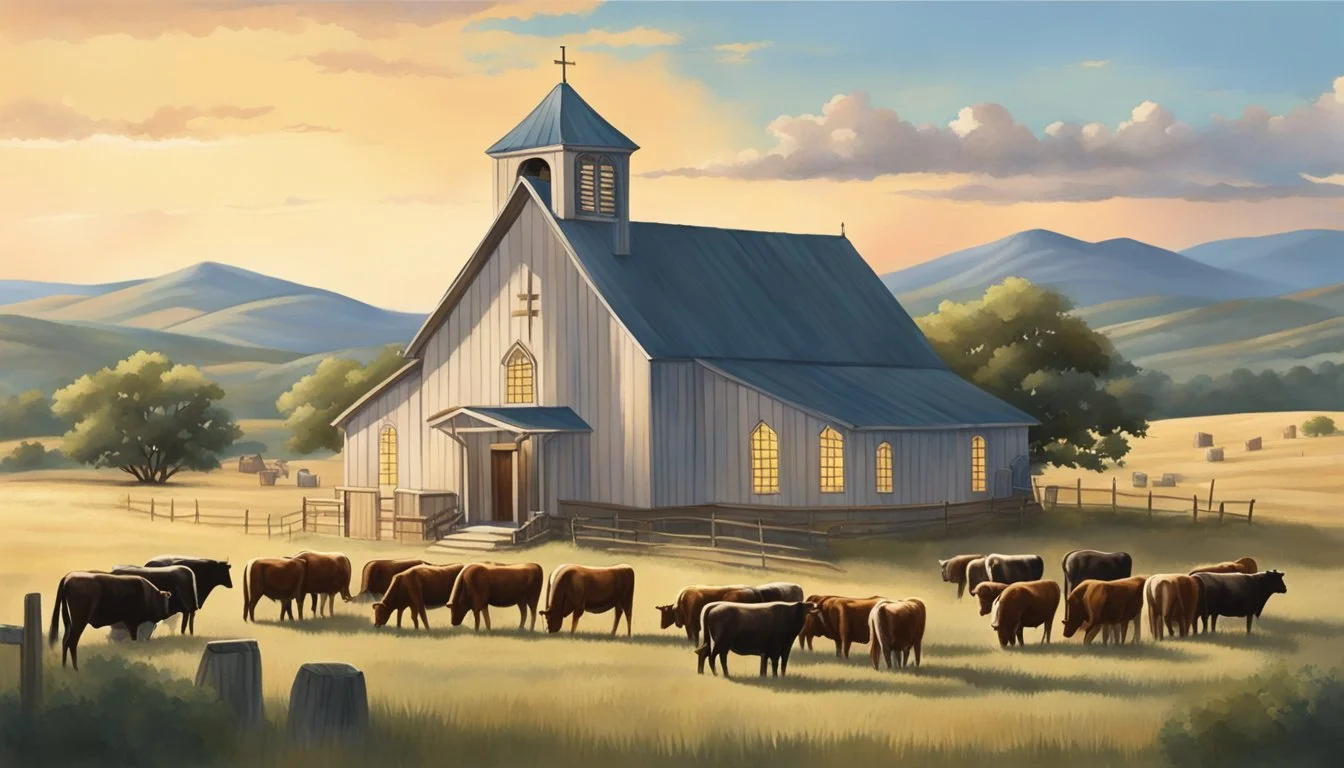Cowboy Churches in Texas
Uniting Faith and Western Heritage
Each Texas cowboy church offers a unique blend of Christian worship and cowboy culture, catering specifically to the Western heritage deeply rooted in the state's history. These churches form a significant part of the religious landscape, connecting with individuals who identify with the cowboy way of life. The rise in the number of cowboy churches corresponds with a desire to merge faith and a love for the Western lifestyle, accommodating a community that might not feel as comfortable in more traditional church settings.
The American Fellowship of Cowboy Churches is one such organization that embodies this fusion, playing a crucial role in the spread of cowboy churches across Texas and beyond. By providing resources and leadership and establishing a network of like-minded congregations, they work to connect "cowboys to Christ," emphasizing a casual, come-as-you-are approach to cowboy church attendance. This ethos resonates with many Texans who find solace in the blend of down-to-earth services and the familiarity of their Western heritage.
While the term 'cowboy church' might suggest exclusivity, these institutions are known for inclusiveness. They invite individuals from all walks of life to partake in their community, whether or not they have a cowboy background. This openness has contributed to the growing popularity of the cowboy church, illustrating how they adapt the message of Christianity to the cultural needs of a specific community while remaining accessible to anyone interested in their unique approach to worship and community.
History of the Cowboy Church
The Cowboy Church movement intertwines the distinct elements of cowboy culture with Christian worship, creating a unique religious experience that reflects Western heritage.
Establishment of the Cowboy Church Movement
The first seeds of the Cowboy Church movement were planted by a 1940s radio program known as "Cowboy Church in the Air." Despite this early presence in the media, it was not until the 1970s that cowboy churches began physically assembling, frequently at rodeo arenas across the United States. In Texas, where the cowboy culture is deeply embedded in the state's identity, each cowboy church gained traction, reflecting the values and lifestyle of the cowboy community.
American Fellowship of Cowboy Churches (AFCC): This organization is a pivotal network connecting cowboy churches nationwide, offering a support system that upholds their distinct Western heritage. Their efforts aim to extend the reach and influence of the cowboy church beyond individual communities.
The Cowboy Church of Ellis County, situated in Waxahachie, Texas, exemplifies the "come as you are" ethos, welcoming everyone regardless of background. Founded in 2000, it is a testament to the growing popularity of the cowboy church in the region.
The cowboy church often prioritize a relaxed atmosphere and simplicity in their services, intending to appeal to individuals who might feel out of place in traditional church settings. The movement encapsulates a fusion of Christian faith with the values and aesthetics of cowboy culture, which is celebrated in various aspects of their gatherings, prayer requests, and from attire to music.
Core Beliefs and Practices
The Cowboy Church in Texas prioritize an authentic expression of Christian faith merged with the cowboy way of life. This fusion shapes their distinctive theology, cultural integration, and communal values.
Distinctive Theology
The Cowboy Church emphasizes a straightforward interpretation of the Bible, often eschewing complex theological discussion for a more direct understanding of Scripture. They hold to the basic tenets of Christian belief, namely:
There is one eternally existing God who manifests in three persons: Father, Son, and Holy Spirit.
Jesus Christ is the son of God, whose death on the cross offers salvation to all who believe.
Accepting Jesus Christ leads to a reconciled life with God, embracing His grace.
Cowboy Culture Integration
Worship services in each Cowboy Church often reflects cowboy culture, from the music to the attire and upcoming events. They strive to create an environment where:
Traditional church formalities are set aside for a more casual and welcoming atmosphere.
Christian music with a country feel is preferred, and cowboy church members may dress in typical cowboy attire.
Focus on Community and Family
Family and community are central to the Cowboy Church, with services and ministries designed to enhance these bonds:
Church Services and outreach ministry are family-oriented, aiming to engage every age group.
Emphasis is placed on applying the Word of God to daily life and relationships.
Church Services and Worship
In Texas, the cowboy church offers a unique worship experience that blends traditional Christian beliefs with a love for cowboy culture. A relaxed dress code characterizes these services and often incorporates country music.
Typical Worship Experience
At each cowboy church, such as like High Point Cowboy Church, worship services are conducted in a laid-back manner where congregants can attend in casual attire, often including hats and boots. Services typically commence with a brief welcome followed by praise and worship in the church. It is not uncommon for a cowboy church to hold upcoming events in unconventional locations such as barns or arenas, emphasizing accessibility and outreach ministry in a non-judgmental atmosphere.
Music and Homily
Country Gospel Band: Music plays a central role in the cowboy church service, with many churches featuring a country gospel band that performs traditional hymns and contemporary Christians music with a country twist.
Sermons: Preachers deliver sermons on Sunday mornings that offer hope and connect the teachings of Jesus Christ to everyday life experiences, often incorporating equestrian or ranch metaphors.
Worship Upcoming Events:
High Point Cowboy Church: Worship Service Sunday mornings at 9:30 am.
Trail of Life Cowboy Church: Sunday Mornings Worship at 10:30am alongside Children's Church.
Top Rail Cowboy Church: Wednesday worship services at 7:00 pm and special Friday upcoming events, including Celebrate Recovery.
Outreach Ministry and Community Events
Each Cowboy church in Texas actively engages its communities through various upcoming events that often reflect its members' unique culture and interests. These upcoming events serve as opportunities to witness outreach ministry, fellowship, worship, and catching up on the latest content.
Rodeos and Arena Events
Rodeos and arena events are central to cowboy church activities, allowing them to connect with their roots in cowboy culture. Upcoming events at these gatherings typically include bull riding, barrel racing, and team roping. They are considered more than just sports events; they are times of fun, community gathering, and ministry.
Baptisms and Weddings
Baptisms often take place in a stock tank, an alternative to traditional baptismal fonts, symbolizing new beginnings in a manner that resonates with the cowboy ethos. Weddings are also common occurrences, combining traditional Christian ceremonies with the unique cultural aspects of the cowboy lifestyle.
Social Gatherings and Charity Work
Each Cowboy church hosts social gatherings and outreach ministry for fellowship, including potlucks, concerts, and picnics at the cowboy camp. Charity work is integral to their mission, where congregations unite to support each other's lives and their local communities through fundraisers and service projects.
Organizational Structure
Each Cowboy church in Texas operates under a unique organizational framework that aligns with their Western heritage and Christian values. The structure is designed to foster community engagement and promote the spread of the Gospel through culturally relevant means.
Leadership Roles
The pastor is at the core of the structure of a cowboy church, leading the congregation and overseeing church functions. The pastor typically embodies qualities resonant with cowboy culture, offering a relatable spiritual guide for the community. As part of a non-profit Christian organization, cowboy churches might also form affiliations with larger bodies such as the American Fellowship of Cowboy Churches (AFCC), which provides support and guidance.
Key Positions:
Senior Pastor: The primary spiritual leader
Associate Pastor: Assists the Senior Pastor; may focus on youth or specific ministries.
Lay Pastor: Volunteers who may lead smaller groups or assist in pastoral duties
Volunteer and Member Involvement
Volunteers and church members play a crucial role in cowboy churches, often embodying a hands-on approach to ministry. Position opportunities for laypeople include a range of roles, from administrative tasks to active ministry work. Volunteers might organize upcoming events, lead a worship service, or even help with Church planting efforts, echoing the expansionist ethos of the cowboy lifestyle.
Volunteer Opportunities:
Ministry Teams: Groups focusing on specific church functions or outreach
Event Organization: Planning and executing church upcoming events
Worship Leaders: Leading or participating in the musical aspects of worship service
These roles contribute to the church's commitment to creating a welcoming environment where people connect to their faith in a comfortable and authentic setting.
Youth and Family Ministries
Cowboy churches in Texas emphasize engaging young members and fostering family participation through dedicated ministries and activities.
Youth Groups
Youth groups within cowboy churches provide a platform for teens and children to explore faith within a community that shares their interest in Western heritage. They often incorporate riding and roping activities with spiritual teachings. For example, Triple Cross Cowboy Church of Hood County strives to grow its student ministry, reaching out to youth for spiritual guidance and honing their skills in rodeo disciplines.
Family-Centered Activities
Family-centered activities in these churches are designed to unite all members, nurturing familial bonds through shared worship and upcoming events. Church services and Bible studies are scheduled to accommodate families, as seen at Willis Cowboy Fellowship, where Sunday Mornings Worship and Round Pen Bible Study occur weekly, offering adults and children the chance to participate in church life and enhance their faith journey as a unit.
Cowboy Church Locations
Cowboy churches are a distinctive type of Christian church within Texas, with a significant presence. They embrace the culture and traditions of the cowboy lifestyle and are usually found in settings that reflect this heritage.
Spread Across Texas
Cowboy churches are widely spread throughout Texas, reflecting the state's rich Western heritage. While many are concentrated in rural areas, embodying the traditional cowboy lifestyle, some have welcomed congregations in towns and cities, adapting to the needs of their members.
Ellis County: Home to what is reported to be the largest cowboy church in the world. Join us.
Mineral Wells: Location of a notable cowboy church within the rural landscape.
Kyle, Texas: Brushwood Cowboy Church serves the community and is easily accessible to residents. Join us.
Brenham, TX: The Cowboy Church of Brenham. We “do church” Cowboy Style, with Country & Western Music, get-to-the-point culturally relevant messages, and Arena Events and dances. Join us. Download app stay connected.
Rural vs. Urban Presence
Cowboy churches often favor rural settings, with many church services in barns or other agricultural-related structures but still acting as an outreach ministry. This setting aligns with the Western heritage and cowboy culture, offering an authentic atmosphere for each worship service.
Rural Presence: Qualities of these churches include a connection to Western traditions, with many facilities resembling barns or set on ranches.
Urban Presence: While cowboy churches are less common in urban areas, several have established an urban presence, providing a cultural bridge for individuals in the city who seek to retain their cowboy identity.
Joining a Cowboy Church
Cowboy Churches offer a unique fellowship that resonates with individuals seeking a church home that aligns with Western heritage culture. They provide an inviting atmosphere for believers and newcomers to practice their faith within a community that cherishes the cowboy lifestyle.
Becoming a Member
To become a member of a Cowboy Church, one usually does not have to go through formal membership classes. Instead, individuals are encouraged to attend church services and participate in church events regularly. Key steps often include:
Attending church services to experience the welcoming community.
Make contact with the pastor or church leadership to express interest in joining.
Engaging with ministry teams or church groups to build relationships and serve alongside fellow members.
What to Expect
People new to Cowboy Church can expect a laid-back and welcoming environment. Distinct aspects include:
Dress Code: Casual attire, often with a Western flair.
Church Services: Focus on simplicity and straightforward preaching centered on the Gospel of Jesus Christ.
Music: A blend of country, gospel, and traditional hymns to celebrate the life of Jesus Christ.
Community: Strong emphasis on fellowship and removing barriers that may hinder someone from connecting with the church and faith.
Children's Church: Typically offered during the same time as adult worship, catering to the spiritual needs of younger attendees.
Outreach: Cowboy Churches are known for their outreach efforts, often involving rodeo events and other community activities linked to cowboy culture.
Education and Discipleship
Cowboy churches in Texas strongly emphasize education and discipleship, fostering deep-rooted understanding and application of the Word of God. Through various educational initiatives, they aim to develop mature believers equipped for personal growth and ministry.
Bible Studies and Groups
Cowboy churches offer Bible studies and small groups as core components of their discipleship programs. These gatherings deepen the participants' relationship with Christ and enhance their scriptural literacy. Bible studies often involve thematic or book-by-book examination of the Bible, providing an environment for members to discuss and explore the Christian scriptures. Group sessions encourage engagement, allowing believers to express their faith in a supportive community.
Bible Studies: Participants engage in focused studies often centered around the teachings of Jesus Christ, aiming to understand and apply biblical principles to life situations.
Discussion Groups: Allow for sharing personal experiences, fostering a space where the church ministry extends beyond formal worship and into personal connections among the congregation.
Small groups are intentionally kept diverse to encompass various demographics within the church, ensuring a holistic approach to spiritual growth and community building. They often address specific life stages or interests, enabling members to find relatable support and fellowship.
Financial Aspects
Cowboy churches in Texas operate as non-profit Christian organizations, with financial sustenance primarily hinging on member contributions. They rely on these voluntary contributions to support their ministries, maintain operations, and fund community outreach programs.
Tithing and Donations
Cowboy churches encourage their congregants to participate in tithing as a form of worship and investment in their faith community. Tithing, traditionally ten percent of one's income, is a common practice in these churches and vital to financial stability. Monetary and in-kind donations supplement tithes and help expand the churches' capabilities. These funds are allocated with transparency to uphold the trust of the community.
Future of Cowboy Churches
Cowboy churches in Texas anticipate continued expansion as they adhere to their mission of integrating Western culture into their ministry. Their unique blend of faith and cowboy heritage has resonated well within their communities.
Growth
Cowboy churches are positioned for growth as they persist in appealing to individuals who identify with the cowboy culture. Their mission to share beliefs in a context familiar to their congregation is vital to their expansion strategy. Cowboy Church Pastoral Center, for example, focuses on training future church planters, emphasizing the importance of tailoring the Gospel of Jesus Christ to fit into the cowboy way of life.
Number of cowboy churches in Texas: Growing year over year
Critical areas of expansion: Training of church planters, adapting spaces for worship to be more inclusive of Western heritage
Main drivers: Cultural relevance, strong community ties, and a clear mission statement
Challenges
Despite their growth, cowboy churches must navigate challenges such as:
Maintaining authenticity: Ensuring the incorporation of Western culture remains genuine and does not become a gimmick.
Cultural shifts: Addressing changes in demographics and culture while staying true to their core values.
It is critical for cowboy churches to resourcefully balance their Western heritage with the changing landscapes of church attendance and religious affiliation.

